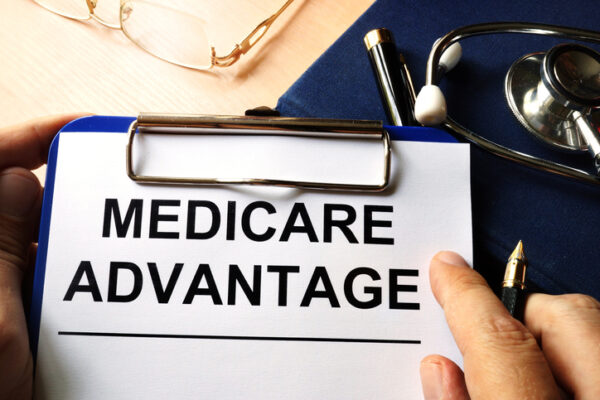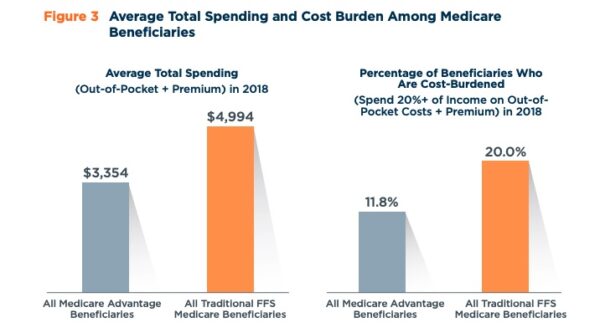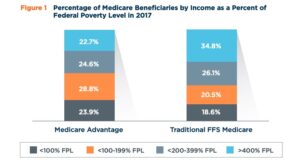
Seniors enrolled in Medicare Advantage plans see a substantial cost-saving in their annual health expenses as compared with those in traditional fee-for-service Medicare plans, according to a new analysis.
The analysis, conducted by ATI Advisory for Better Medicare Alliance, is based on Medicare Current Beneficiary Survey data for 2018, the most recent year for which that data is available. [Click to enlarge] 
Medicare Advantage beneficiaries report spending $1,640 less on out-of-pocket costs and premiums compared to their traditional Medicare counterparts, the analysis shows. This lower average spending also reduces the total cost burden of healthcare — which is defined as spending over 20% of income on healthcare — for Medicare Advantage enrollees. Less than 12% of Medicare Advantage beneficiaries experience that cost burden as compared with 20% of the traditional plan enrollees.
 This could explain why low-income Americans tend to gravitate toward Medicare Advantage plans. In 2018, 52.7% of Medicare Advantage beneficiaries lived below 200% of the federal poverty line versus only 39.1% of traditional Medicare plan members. [Click to enlarge]
This could explain why low-income Americans tend to gravitate toward Medicare Advantage plans. In 2018, 52.7% of Medicare Advantage beneficiaries lived below 200% of the federal poverty line versus only 39.1% of traditional Medicare plan members. [Click to enlarge]
Further, Medicare Advantage beneficiaries are more likely to be dual-eligible for Medicaid and Medicare (21.9%) as compared with traditional Medicare enrollees (15.3%).
“The consumer savings in Medicare Advantage translates to meaningful financial security and peace of mind for millions of beneficiaries,” said Allyson Schwartz, president and CEO of the Better Medicare Alliance, in a news release.
But the difference in cost-savings does not appear to have had an effect on satisfaction rates for either type of insurance plan.
A majority of Medicare Advantage (94.6%) and traditional fee-for-service Medicare beneficiaries (95.3%) report being “satisfied” or “very satisfied” with the overall quality of healthcare they have received in the past year.
In addition, 96% of Medicare Advantage enrollees reported being satisfied or very satisfied with the ease of getting to a physician or other health professional near where they live. About 94% of traditional Medicare beneficiaries said the same.
In 2020, about 39% of all Medicare beneficiaries — 24.1 million people — were enrolled in Medicare Advantage plans, according to Kaiser Family Foundation. The Congressional Budget Office projects that the share of all Medicare beneficiaries enrolled in these plans will jump to 51% by 2030.
Picture: designer491, Getty Images










